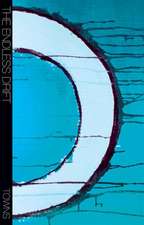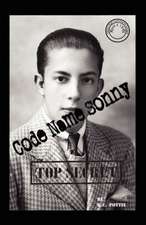Delirium
Autor Laura Restrepo Traducere de Natasha Wimmeren Limba Engleză Paperback – 29 feb 2008
Preț: 91.54 lei
Nou
Puncte Express: 137
Preț estimativ în valută:
17.52€ • 18.10$ • 14.58£
17.52€ • 18.10$ • 14.58£
Carte indisponibilă temporar
Doresc să fiu notificat când acest titlu va fi disponibil:
Se trimite...
Preluare comenzi: 021 569.72.76
Specificații
ISBN-13: 9780307278043
ISBN-10: 0307278042
Pagini: 320
Dimensiuni: 154 x 202 x 20 mm
Greutate: 0.25 kg
Editura: Vintage Books USA
ISBN-10: 0307278042
Pagini: 320
Dimensiuni: 154 x 202 x 20 mm
Greutate: 0.25 kg
Editura: Vintage Books USA
Notă biografică
Laura Restrepo is the bestselling author of several prizewinning novels published in over a dozen languages, including Leopard in the Sun, which won the Arzobispo San Clemente Prize, The Angel of Galilea, which won the Sor Juana Ines de la Cruz Prize in Mexico and the Prix France Culture in France, and Delirium, which won the 2004 Alfaguara Prize, the Grinzane Cavour Prize in Italy, and was shortlisted for the Prix du Meilleur Livre Etranger in France. She lives in Mexico City.
Extras
I KNEW SOMETHING irreparable had happened the moment a man opened the door to that hotel room and I saw my wife sitting at the far end of the room, looking out the window in the strangest way. I’d just returned from a short trip, four days away on business, and I swear that Agustina was fine when I left, I swear nothing odd was going on, or at least nothing out of the ordinary, certainly nothing to suggest what would happen to her while I was gone, except for her own premonitions, of course, but how was I to believe her when Agustina is always predicting some catastrophe; I’ve tried everything to make her see reason, but she won’t be swayed, insisting that ever since she was little she’s had what she calls the gift of sight, or the ability to see the future, and God only knows the trouble that’s caused us.
This time, as usual, my Agustina predicted that something would go wrong, and once again, I ignored her prediction; I went away on a Wednesday, leaving her painting the apartment walls green, and on Sunday, when I returned, I found her in a hotel in the north of the city, transformed into someone terrified and terrifying, a being I barely recognized. I haven’t been able to find out what happened to her while I was gone because when I ask she turns on me, it’s incredible how fierce she can be when she’s upset, she treats me as if I'm not me and she’s not who she used to be, or at least that’s how I try to explain it, and if I can’t it’s because I don’t understand it myself. The woman I love is lost inside her own head and for fourteen days now I’ve been searching for her, wearing myself out trying to find her, but it’s excruciating and impossibly difficult; it’s as if Agustina were living on a plane parallel to reality, close but just out of reach, as if she were speaking a strange language that I vaguely recognize but can’t quite comprehend. My wife’s unhinged mind is a dog snapping at me, but at the same time its barking is a call for help, a call to which I’m unable to respond; Agustina is a hurt and starving dog who wants to go home but can’t, and the next minute she’s a stray dog who can’t even remember it once had a home.
***
I'M GOING TO TELL YOU this point–blank because you have the right to know it, Agustina sweetheart, and anyway what do I have to lose talking about it all, when I’ve got nothing left anymore. Your husband is spinning in circles trying to find out what the hell happened to you and there’s so much even you don’t know, because listen, Agustina darling, all stories are like a big cake, with everybody’s eyes on the piece they’re eating, and the only one who sees the whole thing is the baker. But before I start, let me tell you that I’m happy to see you, despite everything I’ve always been happy to see you, and the truth is that after what happened you’re the only person I wanted to see. Will you believe me if I tell you that this disaster started with a simple bet? It’s almost embarrassing to confess, Agustina doll, because you took it all so seriously and were hurt so badly by it, but it was the lowest kind of bet, a dirty joke if we’re going to call things by their true names, a prank that turned bloody.
We dubbed it Operation Lazarus, because the idea was to see whether we could breathe life back into Spider Salazar’s pecker, which had been dead between his legs since the accident at the Las Lomas Polo Club. Do you remember the scandal, Agustina darling? The truth is, it was a stupid, ordinary accident, although later people tried to make it seem more heroic by spreading the story that Spider fell off his horse during a match against a Chilean team, but the rough stuff actually came later, during a drunken free–for–all, because the match was in the morning and Spider had watched it from one of the bottom rows of the stands since he’s too fat to make it up to the top, and I can tell you that the closest he got to the action was betting on the Chileans and against the locals. The Chileans won and then were treated to a typical Colombian lunch that they probably choked down out of politeness, who knows what folk dishes were foisted on them—suckling pig, tamales, fritters, figs with caramel cream, or all of the above—and then they went back to their hotel to digest it while at the club the revelry went on, everyone getting drunker by the minute. Rivers of whiskey flowed, it got dark, and the only people left were the local polo players and the club regulars when Spider and his pals decided to saddle up, and I’m guessing, or actually I know, that when the happy pack rode into the night they were all as drunk as cossacks, a gang of juiced–up clowns; I don’t know whether your brother Joaco was with them, Agustina doll, though probably he was, because Joaco never misses the chance for a spree.
They mounted the horses, which are high–strung to begin with and don’t appreciate overweight brutes squashing their kidneys and making them gallop in the dark along muddy paths, followed by a procession of Toyota 4x4s full of bodyguards, you know how it is, angel, because you come from that world and escaped it only when you'd had all you could stomach, but does the aftertaste ever go away?, no, sweetheart, the taste of shit lingers in your mouth no matter how many times you gargle with Listerine. Every fat cat from Las Lomas Polo is shadowed wherever he goes by five or six escorts, and Spider Salazar is even worse; ever since he struck it rich he’s had himself protected by a troop of thugs trained in Israel, and that night Spider, who hadn’t been on a horse for months because he was clogged with cholesterol and had to content himself with watching from the stands, that night Spider, who was completely plastered, ordered them to bring him the most spirited horse, a big, imperious bay called Parsley, and if I say “called,” Agustina princess, it’s because no one calls it anything anymore, since in the darkness, the mud, and the commotion, Parsley lost his temper and threw Spider, slamming him against a rock, and then some genius of a bodyguard, a guy they call the Sucker, had the brilliant idea of teaching the horse a lesson by blasting it with his machine gun, leaving it riddled like a sieve with its hooves pointing up at the moon, the most pathetic little scene imaginable. In a single burst the idiot pissed away the two hundred and fifty grand Parsley was worth, because that’s life, Agustina sweetheart, fortunes go down the drain in a single binge and nobody bats an eye.
***
THE GIRL AGUSTINA hugs another, smaller child tight; it’s her brother Bichi, who has a head full of dark curls, a Christ Child, the kind artists paint with black hair instead of golden. It’s the last time, Bichito, Agustina promises him, my father will never hit you again because I’m going to stop him, don’t hold your arm like that, like a chicken with a broken wing, come here, Bichi, little brother, you have to forgive my father’s bad hands because his heart is good, you have to forgive him, Bichi, and not stare at him like that because if you do he’ll go away and it’ll be your fault, does your arm still hurt?, come here, it’s all right, if you stop crying your sister, Agustina, will summon you to the great ceremony of her powers, and we’ll do what we always do, she’ll get the pictures from their hiding place and Bichi will spread the black cloth on the bed, you and me preparing for the service that will make my eyes see, Agustina calls up the great Power that lets her know when her father is going to hurt her brother, you’re the Bichi I loved so much, Agustina repeats over and over again, the Bichi I love so very very much, my darling little brother, the beautiful boy who abandoned me a lifetime ago and is lost to me now.
I’ll cure your broken wing, sings Agustina, rocking him against her, I’ll kiss it and make it better. The only problem is that the powers of divination come to her when they feel like it, not when she calls on them, that’s why the ceremony doesn’t always work the same way even though the two children put on their robes and do everything right, step by step, carefully performing each step, but it isn’t the same, Agustina complains, because the powers forsake me sometimes, the visions fade and Bichi is left defenseless, not knowing when the thing that's sure to happen to him will happen. But when they’re going to come they announce their arrival with a flicker of the eyelids, the First Call, because Agustina’s powers were, are, her eyes’ ability to see beyond, to what’s still to come, to what hasn’t come yet. The Second Call is when the head tilts back of its own accord, as if it were descending a staircase, as if the neck were tugging it down and making it toss its hair like the Weeping Woman when she wanders the hills. I know Bichi is terrified by the Second Call, and he doesn’t want to know anything about the Weeping Woman or the wild rhythms of her flowing hair, which is why he begs me not to roll my eyes back in my head and toss my hair because If you keep doing that Agustina, I’ll go to my room, Don’t go Bichi Bichito, don’t go and I won’t do it anymore, I’ll control the shaking so I don’t scare you, because after all this is a ceremony of healing and comfort, I’d never hurt you, I only want to protect you, and in return you have to promise me that you’ll forgive my father even when he hits you, my father says it’s for your own good and parents know things that children don’t.
***
EVER SINCE MY WIFE has been acting so strange, I’ve dedicated myself to helping her, but I’ve only managed to irritate her with my futile selfless efforts. For example, yesterday, late at night, Agustina got angry because I wanted to take a cloth and dry the rug that she’d soaked, obsessed with the idea that it smelled strange, and the thing is, it disturbs me to see all the pots of water she sets around the apartment, she’s taken to performing baptisms, or ablutions, or who knows what kind of rituals invoking gods invented by her, washing everything and scouring it with excessive zeal, my unfathomable Agustina, any spot on the tablecloth or grime on a windowpane torments her, dust on the moldings makes her miserable, and the muddy footprints she claims my shoes leave make her furious; even her own hands seem disgusting to her though she scrubs them incessantly, her beautiful pale hands red and chafed now because she gives them no respite, and she gives me no respite, and she gives herself no respite.
As Agustina performs her mad ceremonies she gives orders to Aunt Sofi, who has volunteered her services as willing acolyte, and the two rush about with containers of water as if this is how they’ll exorcise anxiety, or regain lost control, and I can find no part to play in this story, nor do I know how to curb the mystical mania that’s invading the house in the form of cups of water that appear in rows along the baseboards, or on the window ledges. I open a door suddenly and upset a plate of water that Agustina’s hidden behind it, or I’m unable to go upstairs because she’s set pots of water on each step. How can I go up the stairs, Aunt Sofi, when Agustina’s blocked them? Stay down here for now, Aguilar, be patient and don't move those pots because you know what a fuss she’ll make. And where will we eat, Agustina darling, now that you’ve covered the table with plates of water? She’s put them on the chairs, on the balcony, and around the bed, the river of her madness leaving its traces even on the bookshelves and in the cupboards; wherever she goes, quiet eyes of water open up, gazing into nothing or the unknown, and rather than being upset I feel the anguish of not knowing what bubbles are bursting inside her, what poisonous fish are swimming the channels of her brain, and all I can think to do is wait until she’s off guard, and empty cups and plates and buckets and return them to their place in the kitchen, and then I ask you why you look at me with hatred, Agustina my love, it must be because you don’t remember me, but sometimes you do, sometimes she seems to recognize me, vaguely, as if through a fog, and her eyes offer reconciliation for an instant, but only for an instant before I immediately lose her and the same terrible hurt invades me.
Strange comedy, or tragedy for three voices, Agustina with her ablutions, Aunt Sofi who plays along with her, and I, Aguilar, an observer asking myself when reason fled, that thing we call reason; an invisible force, but when it’s missing, life isn’t life and what’s human is no longer human. What would we do without you, Aunt Sofi? At first I stayed home twenty–four hours a day watching Agustina and hoping that at any minute she would return to her senses, but as the days went by I began to suspect that the crisis wouldn’t come to an end overnight and I knew I’d have to pluck up the courage to face daily life again. Maybe the hardest part is accepting the stretch of middle ground between sanity and madness and learning to straddle it; by the third or fourth day of delirium the money I had on me ran out and ordinary demands arose again, if I didn’t go out to collect the money I was owed and do my weekly deliveries there wouldn’t be anything to buy food with or pay the bills, but there was no way for me to hire a nurse to stay with Agustina while I was gone and make sure she didn’t escape or do something hopelessly crazy, and it was then that the woman who said her name was Aunt Sofi rang the doorbell.
She showed up just like that, as if heaven–sent, with her two suitcases, her felt hat topped by a feather, her easy laugh, and her comfortable manner of a German from the provinces, and while she was standing in the doorway, before she’d been invited in, she explained to me that it had been years since she’d had anything to do with the family, that she lived in Mexico and had flown in to help care for her niece for as long as necessary. This struck me as odd, because my wife had never spoken to me about any aunt, and yet Agustina seemed to recognize her, or at least she recognized her hat, because she laughed, I can’t believe you still wear that little cap with the goose feather, that was all Agustina said to her but she said it warmly, cheerfully, and yet there was something that made me uneasy, if this woman hadn't been in contact with the family, how had she learned of her niece’s breakdown, and when I asked her, she simply said, I’ve always known, Wonderful, I thought, either something’s not right here or I’ve just landed myself another seer.
From the Hardcover edition.
This time, as usual, my Agustina predicted that something would go wrong, and once again, I ignored her prediction; I went away on a Wednesday, leaving her painting the apartment walls green, and on Sunday, when I returned, I found her in a hotel in the north of the city, transformed into someone terrified and terrifying, a being I barely recognized. I haven’t been able to find out what happened to her while I was gone because when I ask she turns on me, it’s incredible how fierce she can be when she’s upset, she treats me as if I'm not me and she’s not who she used to be, or at least that’s how I try to explain it, and if I can’t it’s because I don’t understand it myself. The woman I love is lost inside her own head and for fourteen days now I’ve been searching for her, wearing myself out trying to find her, but it’s excruciating and impossibly difficult; it’s as if Agustina were living on a plane parallel to reality, close but just out of reach, as if she were speaking a strange language that I vaguely recognize but can’t quite comprehend. My wife’s unhinged mind is a dog snapping at me, but at the same time its barking is a call for help, a call to which I’m unable to respond; Agustina is a hurt and starving dog who wants to go home but can’t, and the next minute she’s a stray dog who can’t even remember it once had a home.
***
I'M GOING TO TELL YOU this point–blank because you have the right to know it, Agustina sweetheart, and anyway what do I have to lose talking about it all, when I’ve got nothing left anymore. Your husband is spinning in circles trying to find out what the hell happened to you and there’s so much even you don’t know, because listen, Agustina darling, all stories are like a big cake, with everybody’s eyes on the piece they’re eating, and the only one who sees the whole thing is the baker. But before I start, let me tell you that I’m happy to see you, despite everything I’ve always been happy to see you, and the truth is that after what happened you’re the only person I wanted to see. Will you believe me if I tell you that this disaster started with a simple bet? It’s almost embarrassing to confess, Agustina doll, because you took it all so seriously and were hurt so badly by it, but it was the lowest kind of bet, a dirty joke if we’re going to call things by their true names, a prank that turned bloody.
We dubbed it Operation Lazarus, because the idea was to see whether we could breathe life back into Spider Salazar’s pecker, which had been dead between his legs since the accident at the Las Lomas Polo Club. Do you remember the scandal, Agustina darling? The truth is, it was a stupid, ordinary accident, although later people tried to make it seem more heroic by spreading the story that Spider fell off his horse during a match against a Chilean team, but the rough stuff actually came later, during a drunken free–for–all, because the match was in the morning and Spider had watched it from one of the bottom rows of the stands since he’s too fat to make it up to the top, and I can tell you that the closest he got to the action was betting on the Chileans and against the locals. The Chileans won and then were treated to a typical Colombian lunch that they probably choked down out of politeness, who knows what folk dishes were foisted on them—suckling pig, tamales, fritters, figs with caramel cream, or all of the above—and then they went back to their hotel to digest it while at the club the revelry went on, everyone getting drunker by the minute. Rivers of whiskey flowed, it got dark, and the only people left were the local polo players and the club regulars when Spider and his pals decided to saddle up, and I’m guessing, or actually I know, that when the happy pack rode into the night they were all as drunk as cossacks, a gang of juiced–up clowns; I don’t know whether your brother Joaco was with them, Agustina doll, though probably he was, because Joaco never misses the chance for a spree.
They mounted the horses, which are high–strung to begin with and don’t appreciate overweight brutes squashing their kidneys and making them gallop in the dark along muddy paths, followed by a procession of Toyota 4x4s full of bodyguards, you know how it is, angel, because you come from that world and escaped it only when you'd had all you could stomach, but does the aftertaste ever go away?, no, sweetheart, the taste of shit lingers in your mouth no matter how many times you gargle with Listerine. Every fat cat from Las Lomas Polo is shadowed wherever he goes by five or six escorts, and Spider Salazar is even worse; ever since he struck it rich he’s had himself protected by a troop of thugs trained in Israel, and that night Spider, who hadn’t been on a horse for months because he was clogged with cholesterol and had to content himself with watching from the stands, that night Spider, who was completely plastered, ordered them to bring him the most spirited horse, a big, imperious bay called Parsley, and if I say “called,” Agustina princess, it’s because no one calls it anything anymore, since in the darkness, the mud, and the commotion, Parsley lost his temper and threw Spider, slamming him against a rock, and then some genius of a bodyguard, a guy they call the Sucker, had the brilliant idea of teaching the horse a lesson by blasting it with his machine gun, leaving it riddled like a sieve with its hooves pointing up at the moon, the most pathetic little scene imaginable. In a single burst the idiot pissed away the two hundred and fifty grand Parsley was worth, because that’s life, Agustina sweetheart, fortunes go down the drain in a single binge and nobody bats an eye.
***
THE GIRL AGUSTINA hugs another, smaller child tight; it’s her brother Bichi, who has a head full of dark curls, a Christ Child, the kind artists paint with black hair instead of golden. It’s the last time, Bichito, Agustina promises him, my father will never hit you again because I’m going to stop him, don’t hold your arm like that, like a chicken with a broken wing, come here, Bichi, little brother, you have to forgive my father’s bad hands because his heart is good, you have to forgive him, Bichi, and not stare at him like that because if you do he’ll go away and it’ll be your fault, does your arm still hurt?, come here, it’s all right, if you stop crying your sister, Agustina, will summon you to the great ceremony of her powers, and we’ll do what we always do, she’ll get the pictures from their hiding place and Bichi will spread the black cloth on the bed, you and me preparing for the service that will make my eyes see, Agustina calls up the great Power that lets her know when her father is going to hurt her brother, you’re the Bichi I loved so much, Agustina repeats over and over again, the Bichi I love so very very much, my darling little brother, the beautiful boy who abandoned me a lifetime ago and is lost to me now.
I’ll cure your broken wing, sings Agustina, rocking him against her, I’ll kiss it and make it better. The only problem is that the powers of divination come to her when they feel like it, not when she calls on them, that’s why the ceremony doesn’t always work the same way even though the two children put on their robes and do everything right, step by step, carefully performing each step, but it isn’t the same, Agustina complains, because the powers forsake me sometimes, the visions fade and Bichi is left defenseless, not knowing when the thing that's sure to happen to him will happen. But when they’re going to come they announce their arrival with a flicker of the eyelids, the First Call, because Agustina’s powers were, are, her eyes’ ability to see beyond, to what’s still to come, to what hasn’t come yet. The Second Call is when the head tilts back of its own accord, as if it were descending a staircase, as if the neck were tugging it down and making it toss its hair like the Weeping Woman when she wanders the hills. I know Bichi is terrified by the Second Call, and he doesn’t want to know anything about the Weeping Woman or the wild rhythms of her flowing hair, which is why he begs me not to roll my eyes back in my head and toss my hair because If you keep doing that Agustina, I’ll go to my room, Don’t go Bichi Bichito, don’t go and I won’t do it anymore, I’ll control the shaking so I don’t scare you, because after all this is a ceremony of healing and comfort, I’d never hurt you, I only want to protect you, and in return you have to promise me that you’ll forgive my father even when he hits you, my father says it’s for your own good and parents know things that children don’t.
***
EVER SINCE MY WIFE has been acting so strange, I’ve dedicated myself to helping her, but I’ve only managed to irritate her with my futile selfless efforts. For example, yesterday, late at night, Agustina got angry because I wanted to take a cloth and dry the rug that she’d soaked, obsessed with the idea that it smelled strange, and the thing is, it disturbs me to see all the pots of water she sets around the apartment, she’s taken to performing baptisms, or ablutions, or who knows what kind of rituals invoking gods invented by her, washing everything and scouring it with excessive zeal, my unfathomable Agustina, any spot on the tablecloth or grime on a windowpane torments her, dust on the moldings makes her miserable, and the muddy footprints she claims my shoes leave make her furious; even her own hands seem disgusting to her though she scrubs them incessantly, her beautiful pale hands red and chafed now because she gives them no respite, and she gives me no respite, and she gives herself no respite.
As Agustina performs her mad ceremonies she gives orders to Aunt Sofi, who has volunteered her services as willing acolyte, and the two rush about with containers of water as if this is how they’ll exorcise anxiety, or regain lost control, and I can find no part to play in this story, nor do I know how to curb the mystical mania that’s invading the house in the form of cups of water that appear in rows along the baseboards, or on the window ledges. I open a door suddenly and upset a plate of water that Agustina’s hidden behind it, or I’m unable to go upstairs because she’s set pots of water on each step. How can I go up the stairs, Aunt Sofi, when Agustina’s blocked them? Stay down here for now, Aguilar, be patient and don't move those pots because you know what a fuss she’ll make. And where will we eat, Agustina darling, now that you’ve covered the table with plates of water? She’s put them on the chairs, on the balcony, and around the bed, the river of her madness leaving its traces even on the bookshelves and in the cupboards; wherever she goes, quiet eyes of water open up, gazing into nothing or the unknown, and rather than being upset I feel the anguish of not knowing what bubbles are bursting inside her, what poisonous fish are swimming the channels of her brain, and all I can think to do is wait until she’s off guard, and empty cups and plates and buckets and return them to their place in the kitchen, and then I ask you why you look at me with hatred, Agustina my love, it must be because you don’t remember me, but sometimes you do, sometimes she seems to recognize me, vaguely, as if through a fog, and her eyes offer reconciliation for an instant, but only for an instant before I immediately lose her and the same terrible hurt invades me.
Strange comedy, or tragedy for three voices, Agustina with her ablutions, Aunt Sofi who plays along with her, and I, Aguilar, an observer asking myself when reason fled, that thing we call reason; an invisible force, but when it’s missing, life isn’t life and what’s human is no longer human. What would we do without you, Aunt Sofi? At first I stayed home twenty–four hours a day watching Agustina and hoping that at any minute she would return to her senses, but as the days went by I began to suspect that the crisis wouldn’t come to an end overnight and I knew I’d have to pluck up the courage to face daily life again. Maybe the hardest part is accepting the stretch of middle ground between sanity and madness and learning to straddle it; by the third or fourth day of delirium the money I had on me ran out and ordinary demands arose again, if I didn’t go out to collect the money I was owed and do my weekly deliveries there wouldn’t be anything to buy food with or pay the bills, but there was no way for me to hire a nurse to stay with Agustina while I was gone and make sure she didn’t escape or do something hopelessly crazy, and it was then that the woman who said her name was Aunt Sofi rang the doorbell.
She showed up just like that, as if heaven–sent, with her two suitcases, her felt hat topped by a feather, her easy laugh, and her comfortable manner of a German from the provinces, and while she was standing in the doorway, before she’d been invited in, she explained to me that it had been years since she’d had anything to do with the family, that she lived in Mexico and had flown in to help care for her niece for as long as necessary. This struck me as odd, because my wife had never spoken to me about any aunt, and yet Agustina seemed to recognize her, or at least she recognized her hat, because she laughed, I can’t believe you still wear that little cap with the goose feather, that was all Agustina said to her but she said it warmly, cheerfully, and yet there was something that made me uneasy, if this woman hadn't been in contact with the family, how had she learned of her niece’s breakdown, and when I asked her, she simply said, I’ve always known, Wonderful, I thought, either something’s not right here or I’ve just landed myself another seer.
From the Hardcover edition.
Recenzii
“Stunning, dense, complex, mind-blowing. . . . This novel goes far above politics, right up into high art.” —The Washington Post Book World“One of the finest novels written in recent memory.” —Jose Saramago“Masterful. . . . Literary dynamite.” —The Milwaukee Journal-Sentinel “Every word in Delirium is perfectly chosen, painfully honest and brutally effective. Restrepo chooses her words like a poet, with infinite care.” —The Philadelphia Inquirer“A disconcertingly lovely book, and its depiction of Colombian society at an awful moment in its history is sharp, vivid, utterly persuasive.” —The New York Times Book Review
Descriere
Descriere de la o altă ediție sau format:
Aguliar returns home after a four-day business trip to discover that his beloved wife has gone mad. Desperate to rescue Agustina from her sudden, devastating insanity, Aguliar delves back into her shadowy past. that of Midas, a flamboyant drug-trafficker and Agustina's former lover, and Agustina's splintered memories of her own troubled childhood.
Aguliar returns home after a four-day business trip to discover that his beloved wife has gone mad. Desperate to rescue Agustina from her sudden, devastating insanity, Aguliar delves back into her shadowy past. that of Midas, a flamboyant drug-trafficker and Agustina's former lover, and Agustina's splintered memories of her own troubled childhood.















